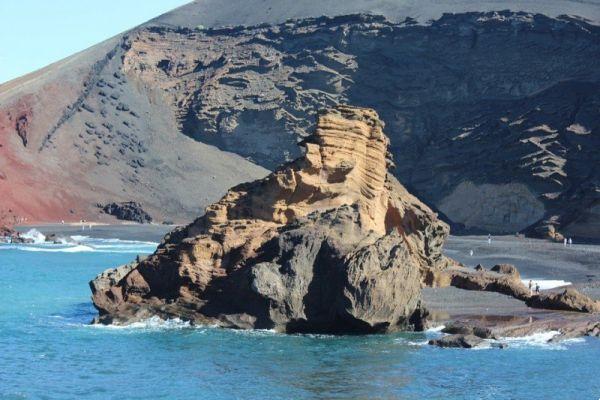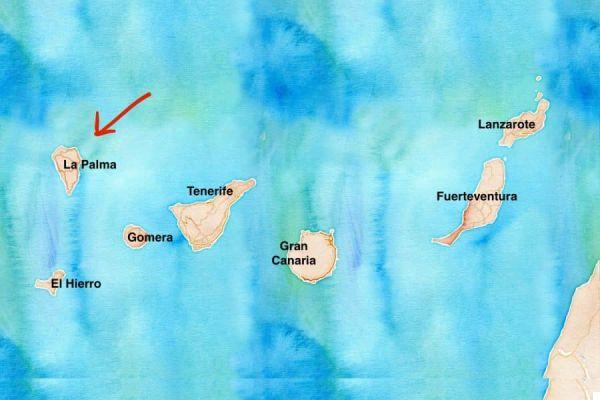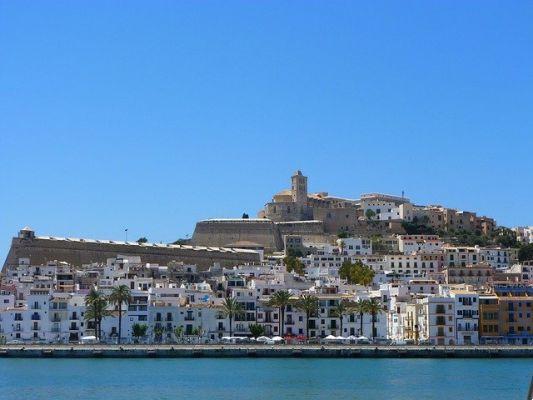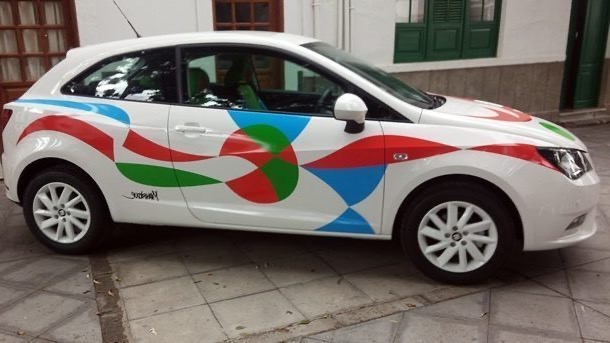If we want to find a positive aspect of the Covid-19 pandemic there is certainly the fact that it has shown many (companies and individuals) that you can work safely in smartworking without losing efficiency, rather! In 2020, many people found themselves working from home and discovered that it is actually possible to do it from anywhere, as long as there is a good internet connection. Why not do it from the Canaries then? Always a good retreat for pensioners from half of Europe thanks to the mild climate all year round, the Canaries have also become one of the destinations of choice for digital nomads and those who can work in smartworking. With this year's restrictions on non-EU countries, the Canary Islands are experiencing a new youth because they represent the hottest place that can be reached in Europe. In this article I therefore wanted to collect some info and useful tips for those who, like I did, want to move to the Canary Islands for a period (short or long) and work in smartworking from here.
Living and working in the Canary Islands during the Covid-19 pandemic: rules and restrictions
Currently (April 2021), there are no restrictions for Spanish citizens in moving to the Canary Islands (you can find the decree on the ViaggiareSicuri website), but the Canaries impose restrictions on whoever enters. From about mid-November 2020, to enter the islands you must show a negative molecular swab done at the latest 72h before departure. The antigenic swab is not accepted. In addition to this you also need to electronically fill in and sign this module di health control (FCS) before the trip. Once completed, you will then receive a barcode that will be asked for several times both at departure, by the air carrier, and upon arrival. Before leaving, however, check the official website of the Canary Islands for safety, as the regulations may change.
With regard to rules / restrictions that apply on the islands, the Canaries adopt a system of colored bands a bit like in Spain, but the restrictions are much milder than ours. To monitor the color (and related restrictions) of the island you want to reach you can visit this site. To monitor the number of infections and the progression of the epidemic instead, find the updated statistics here.
Health insurance is recommended
Being in Europe, as Spanish citizens we have the right to health care, but there are specific conditions and ceilings. My advice is to still take a classic medical-luggage insurance that can cover you during the trip, even for Covid-19. I am very happy with many insurance companies, a site that compares the policies of different companies and proposes the most convenient policy for that particular trip. To do this you will have to enter the data relating to your trip and they will send you an email with the best proposal that you can then buy directly online (!!!). All travel insurances also cover medical assistance in the event of a coronavirus infection, including testing if necessary. There is also coverage for the extension of the stay in the hotel due to the quarantine. Likewise, the trip cancellation guarantee includes coverage for illness or death of the traveler or a family member due to COVID-19.
How much does it cost to live in the Canaries?
The cost of living is lower than in Spain, especially when it comes to mobility (petrol is very cheap, as is renting a car). The cost of the apartments, on the other hand, is slightly lower than in Italy: a two-room apartment in the city costs around 600-700 euros / month. Eating ... depends ... some average restaurants cost exactly like us, 30-35 euros, but you can also spend much less. Even internal flights between the islands are cheap (40-50 euros).

Canary Islands: which one to choose for smartworking?
It is not easy to answer this question, because the 7 islands of the Canary Islands are very different from each other and have particular characteristics. Wanting to summarize (and trivialize even a little) I would say:
- Gran Canaria: the 3rd largest island of the Canary Islands is the destination of choice for many digital nomads because it has a very large (and historical) community, lots of coworking and lots of startups. The most popular place is the capital, Las Palmas, famous for the lunghissima Playa de las Canteras.
- Tenerife: the largest island of the Canaries has a large community of digital nomads, usually located in Santa Cruz de Tenerife (a nord) it Las Americas Beach / Los Cristianos (to the south, more suitable for those who love beaches and sea life).
- Fuerteventura: Fuerteventura is also establishing itself as a destination for smartworking and digital nomadism, especially in the area of Corralejo, where there are also the best surfing spots and a bit of nightlife.
- Lanzarote: from what I understand, Lanzarote does not yet have a specific location where there is a community of digital nomads. The island is much quieter than the other 3 above, but perhaps the most beautiful from a landscape point of view. If you are looking for nature and tranquility..it is the perfect place.
- La Palma, La Gomera and El Hierro: the 3 smallest islands of the archipelago are really small and do not always have a sufficient connection to allow remote work.

How to find a house for a long-term rental in the Canary Islands
Some prefer to have a little house of their own, while others prefer to share the house with other digital nomads. A piece of advice, ask immediately for the speed of the internet connection to avoid surprises (perhaps by sending you the screenshot of the speed test). Some locations, especially the more rural ones in the interior, have a bad connection that would not allow you to work in smartworking.
Whether to find an apartment of your own or a room in a shared apartment in the Canaries, the best channels are:
- Air Bnb: in this case you should contact the owner privately and make you an offer for long-term rental.
- FB groups of digital nomads: each island of the Canary Islands has a FB group of digital nomads (eg this one from Tenerife) where it is possible to make requests or announcements also relating to houses. Many are often looking for roommates or offer housing solutions.
- Facebook Marketplace: the Facebook marketplace is also an excellent tool to look for a house in the Canary Islands.
- Idealistic: a specialized site where you can find accommodation throughout Spain.
Car rental for long periods in the Canary Islands
Unless you decide to stay in a big city (like Las Palmas, Santa Cruz de Tenerife, for example), you will need a car to get around. There are buses, but the connections are not that frequent. Without a car you will also not be able to reach many really beautiful places and you will not be independent in your movements. Fortunately, renting a car in the Canary Islands is very cheap, as is petrol. When I travel I normally use the site of Rentalcars, but for the Canaries the companies with the best value for money are Cicar and Cabrera Medina. They have offices almost everywhere (airports, ports, main and minor cities) and allow you to rent a car without blocking your credit card and with the Kasco without deductible. The cost for a month is around 400-450 euros. The cheapest company ever, however, is More Car; they do not have physical offices but you will fill in an online form where you will indicate the point where you would like to start the rental and they will bring the car there. It is a little more inconvenient, but it saves a good 20-30% on the rental.

Internet and telephone SIM in the Canary Islands
If you intend to stay at least 1-2 months in the Canary Islands, the roaming gigs you have with your tariff plan will not suffice (with 3, for example, they are 8G / month). I solved the problem by buying one Spanish e-sim, or a rechargeable virtual sim. All the latest generation mobile phones (eg from iphone 11 onwards) support virtual sims and you will not have to give up your number for the Spanish one. The mobile will work as a dual-sim, but the 2nd sim will not physically be found in your phone. Among the Spanish companies that offer this service there is Telstra , and has rechargeable contracts from 8-14-18 euros per month to have 6-8-16G (plus unlimited phone calls). All you have to do is go to a Yoigo center and in a few minutes you will have the double telephone line.
Networking in the Canary Islands: how and where to meet other digital nomads
At the base of digital nomadism there is also the desire to meet people who come from other parts of the world and have made the same choice of life as ours. But how and where to meet other nomads when moving to an island in the Canaries? As I told you before, there are gods FB groups dedicated to digital nomads of the various islands where it is possible to network and look for companions for trips, sports, drinking and so on. Many of these FB groups also have gods gruppi your Slack or your Whatsup / Telegram to which you can have access once registered. Among these groups I point out:
- Tenerife Remote Workers & Digital Nomads
- Tenerife Digital Nomad Community
- Fuerteventura Digital Nomad & Expats
- Gran Canaria Digital Nomads
- Global Digital Nomad Network
- Digital Nomads

You might also be interested in these other articles I wrote about the Canary Islands:
- What to see in Tenerife South: 10 places not to be missed
- What to see in Tenerife North: 10 places not to be missed
- Where to stay in Tenerife: the best areas
- Canary Islands: which ones to choose
- The 15 most beautiful beaches in Tenerife
- What to see in La Palma, the 'isla bonita' of the Canaries
- What to see in Lanzarote: all the places not to be missed
- El Hierro: what to see and what to do
- Fuerteventura: what to see and where to go
- How to organize a trip to Lanzarote
- The most beautiful treks in Lanzarote (Canary Islands)
- La Palma (Canary Islands): the most beautiful treks
- Lanzarote: the most beautiful beaches and natural pools


























